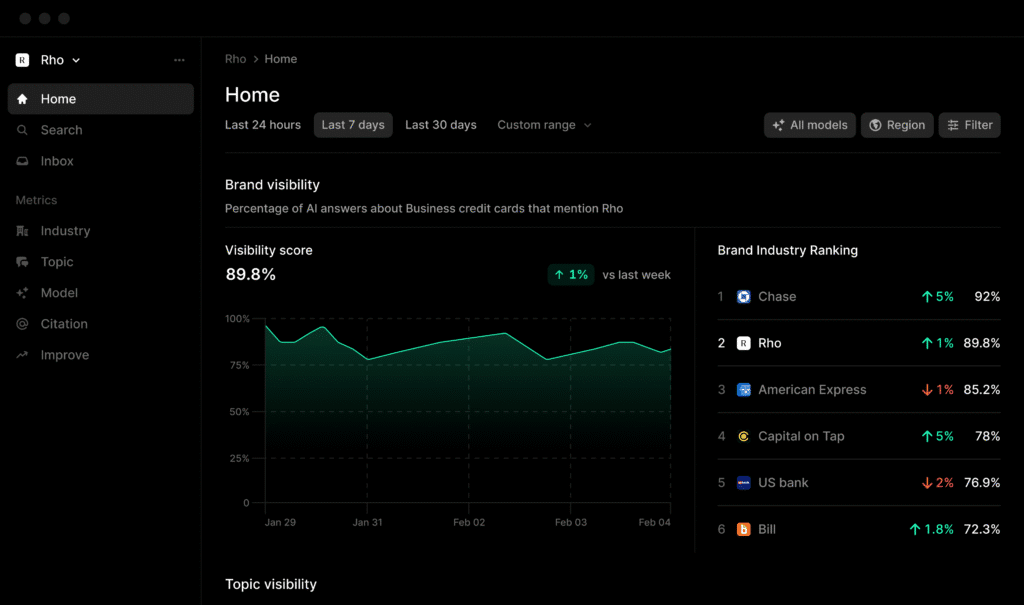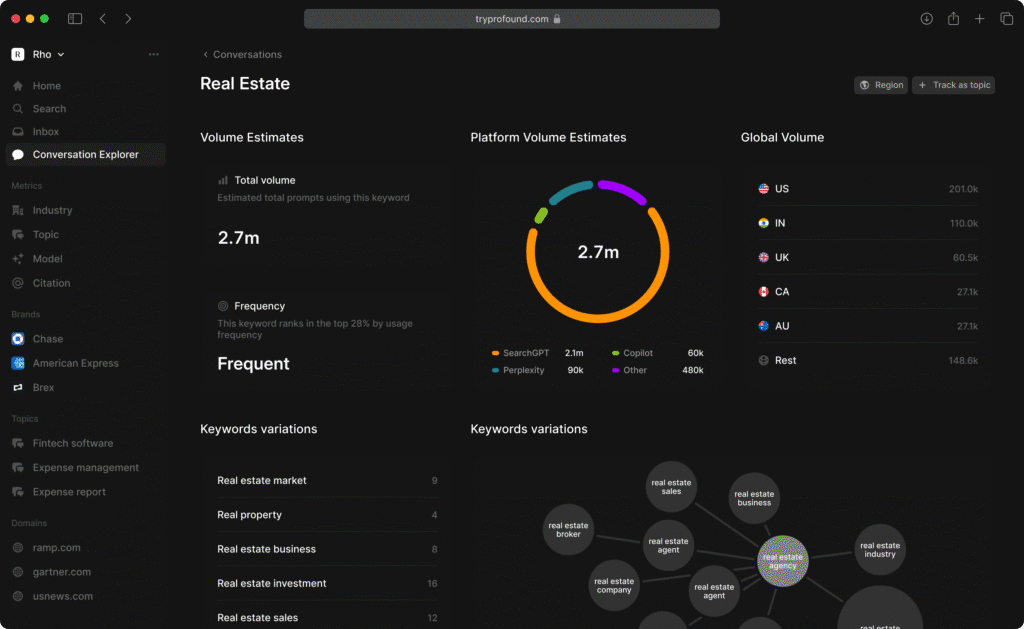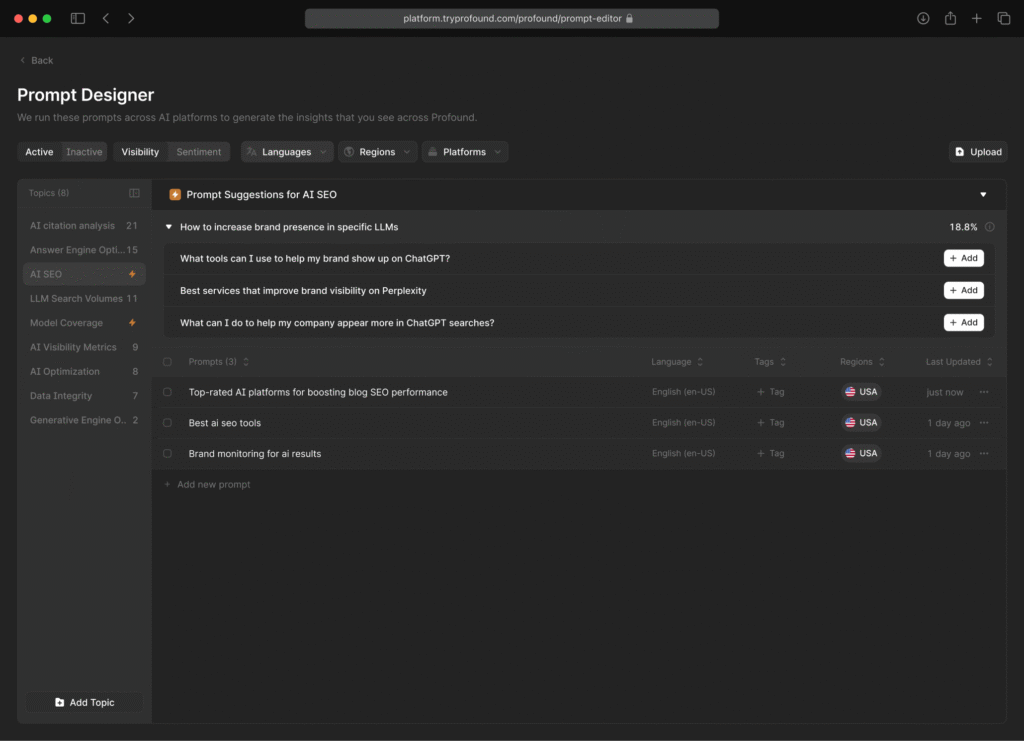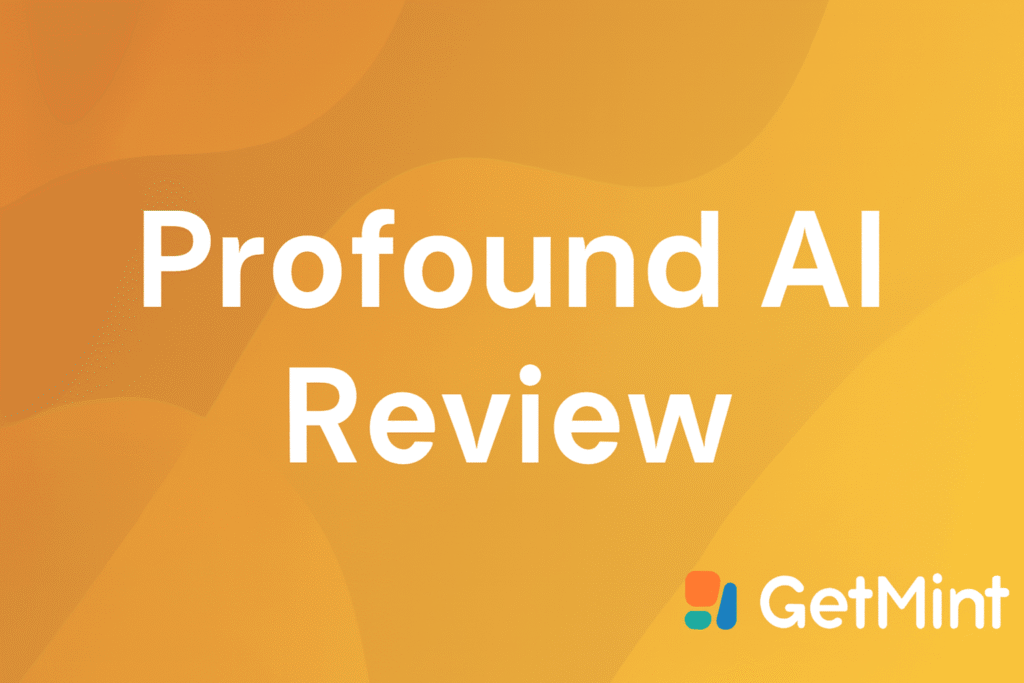With nearly 77% of consumers saying that AI helps them make faster decisions, your content is likely fueling thousands of AI-generated answers, but you’re getting none of the credit or the data.
This creates a strategic blind spot, leaving you unable to track competitor mentions, prove ROI on citations, or justify your content budget with a complete picture of its impact.
Generative Engine Optimization (GEO) platforms have emerged to solve this attribution black hole. Profound, backed by $58.5 million in total funding, has positioned itself as the premium, enterprise-grade solution.
But as a premium solution, an objective profound review is necessary to determine if its performance and features are the right fit for most teams. This GEO platform promises comprehensive AI search visibility tracking, but does it deliver?
What Is Profound and How Does It Work?
Profound is a Generative Engine Optimization (GEO) platform built for large-scale enterprise teams, backed by maor capital firms. As an answer engine optimization tool, it helps brands understand how AI models reference and surface their content.
The platform operates on what it calls a “read/write” model, which aims to improve a brand’s AI search visibility. To understand it, it’s important to distinguish between two important metrics it tracks: citations and mentions.
A citation is a direct, attributable link back to one of your pages from within an AI answer. A mention is when an AI references your brand or product by name without a link.
Improving search visibility involves two main phases: visibility monitoring and content guidance.
Visibility Monitoring
In the monitoring, or “read,” phase, the platform scans major AI models to track brand mentions and citations. This AI search visibility tracking covers platforms like ChatGPT, Perplexity, and Google SGE.
The system also performs sentiment analysis to see if the context of these mentions is positive or negative and benchmarks a brand’s “share of voice” against its competitors.
Content Guidance
The second phase provides content guidance, or the “write” functionality.
This includes a content generation tool to create new articles based on identified visibility gaps, as well as high-level optimization recommendations for improving existing content.
It’s important to note that, although these tools direct you, Profound isn’t an all-in-one execution suite. The technical implementation and content strategy are still managed by a company’s internal team.
Profound’s Key Features
Profound’s feature set is built around its enterprise focus as a GEO platform. It prioritizes comprehensive data analysis over a simplified user experience, which makes it distinct from simpler answer engine optimization tools.
AI Visibility Dashboard
The AI Visibility Dashboard is the hub of the platform. It provides a high-level overview of a brand’s performance in AI search.

The dashboard covers several useful data points. The main feature is the brand visibility graph, which tracks a primary “visibility score” over a selected time period (e.g., Last 7 days, Last 30 days) and shows the trend compared to the previous period.
To the right of the graph, the dashboard includes a brand industry ranking module. This feature benchmarks the user’s brand against direct competitors and shows each company’s current visibility score and its weekly performance trend.
Users can also apply filters to view the data across all AI models or by a specific region. The main navigation on the left indicates that users can drill down into more specific metrics by topic, AI model, or individual citation.
Conversation Explorer
The Conversation Explorer identifies relevant user queries and topics within a specific industry. Here, you can see a list of trending questions.

The feature moves beyond tracking a specific brand name to show the broader conversations where competitors may be cited or mentioned.
For example, a software company could use it to discover that users are asking AI models questions like, “What is the best alternative to [competitor’s product]?”
Multi-Platform Coverage
Profound’s platform tracks a range of AI models. The Growth plan, set at $399 per month, can only monitor three platforms: ChatGPT, Perplexity, and Google AI Overviews.
Full access to the entire suite of 10+ engines, including models like Claude and Grok, is reserved for the custom-priced Enterprise tier.
Custom Prompts and Workflows
This feature allows users to manage specific queries the platform tracks.

Users can add, edit, or disable prompts to make sure that the data collected is relevant to their products and services.
The platform also includes workflow automation capabilities, though user feedback suggests that these aren’t user friendly; they require some technical expertise.
Team Collaboration and Integrations
The platform includes features designed for larger corporate environments. It supports multiple user seats and is SOC 2 Type II compliant.
It also integrates with a number of infrastructure and analytics platforms, including Vercel, AWS, Cloudflare, and Google Analytics.
These integrations are primarily for data collection at the server level, rather than for direct connection with marketing workflows like a CRM.
Profound Pricing Breakdown
As of October 2025, Profound offers a three-tier pricing model. The platform provides Starter, Growth, and Enterprise plans, with features and costs scaling at each level.
| Feature | Starter Plan | Growth Plan | Enterprise Plan |
|---|---|---|---|
| Monthly Price | $99 | $399 | Custom |
| Best For | Basic single-engine monitoring | Small teams needing core analytics | Large enterprises and agencies |
| AI platform coverage | ChatGPT only | Limited (ChatGPT, Perplexity, and Google AI) | Full (10+ engines including Claude, Gemini, and Grok) |
| “Write” Features | ❌ | Capped at 3 articles/month | Custom limits |
| Data Exports | ❌ | CSV, JSON | CSV, JSON |
| API Access | ❌ | ❌ | ✔️ |
| Dedicated Support | Email only | Email only | Dedicated strategist and Slack channel |
Profound’s Strengths
Profound does well in several areas, particularly for its target audience of large, data-driven enterprises.
- Enterprise-grade architecture: The platform is built with a solid foundation and is SOC 2 Type II compliant. It meets the stringent security and data privacy requirements of large corporations.
- Analytics for market research: The platform’s “read” capabilities, which include the Conversation Explorer, can be used to uncover market trends and audience questions directly from model conversations. This AI search visibility data helps inform content strategy.
- “Read/Write” concept: The platform is built on a “read/write” concept that aims to create a loop between data insights and content action.
Profound’s Weaknesses
However, teams should also be aware of some drawbacks that are frequently mentioned in user feedback and are apparent in the platform’s structure.
- Feature gating in pricing tiers: The platform’s most valuable features, including full AI model coverage and API access, are reserved for the custom-priced Enterprise plan. The $99/month and $399/month tiers are limited by the number of AI models they monitor.
- Focus on monitoring over execution: Profound’s primary function is to deliver data and analytics. The basic content generator doesn’t make it an all-in-one execution suite. Users need to have separate tools for technical optimization and advanced content workflows.
- Steep learning curve: Profound isn’t built for casual users. User feedback frequently describes the interface as “data-heavy” and “unintuitive.” Without a dedicated analyst, teams can easily find themselves overwhelmed by the data.
- Technical instability: Multiple user reviews mention recurring technical problems, including bugs in the user interface, problems with integrations, and slow data exports.
What Users Think About Profound
Profound holds a 4.6/5-star rating across 135 reviews.
Users are generally impressed with the platform’s ability to provide previously inaccessible data on AI search, but their praise is often paired with frustrations regarding its complexity and technical performance.
On the positive side, users note that the insights are valuable for “shaping initiatives” and appreciate having all competitor mentions “in one place.”
However, the most common complaints center on the platform’s steep learning curve. Users admit that the data-heavy dashboard can feel “overwhelming” and note that the difficulty of exporting data for reports is a workflow limitation.
Other critical review cite serious reliability issues: one user detailed her experience with broken tracking, billing errors, and features that “don’t work properly.”
In short, Profound’s data is valuable, but the platform is a demanding tool that can present workflow challenges.
Who Should Use Profound?
Profound is a highly specialized tool built for one specific user: a Fortune 500-level company with a dedicated data team and a significant budget.
For any team outside of that profile—including startups, SMBs, and most agencies—the platform’s high cost and steep learning curve make it a difficult choice.
These teams will find a much higher return on investment in an integrated, all-in-one GEO tool. A solution like GetMint, which combines comprehensive monitoring with a user-friendly interface and a built-in Content Studio, is designed as the more practical and cost-effective choice.
Is Profound the Right Tool for You?
At the end of the day, the decision to invest in Profound depends on your team’s specific needs, budget, and technical resources.
For a Fortune 500 company with a team of data analysts and a high budget, the platform’s monitoring capabilities and enterprise-grade security can provide valuable market intelligence. This user profile is best equipped to manage the platform and extract value from its raw data.
However, for teams outside of that specific demographic, the platform’s high price, steep learning curve, and reported technical instability are not to be taken lightly. The feature limitations in the lower-cost tiers mean that most startups, SMBs, and agencies will find themselves paying a premium for an incomplete toolset.
For these users, a more practical investment is often an integrated platform that balances comprehensive analytics with a more user-friendly execution workflow. Platforms like GetMint, for example, are designed to fill this gap in the market.
Frequently Asked Questions (FAQs)
How much does Profound cost?
Profound’s pricing starts at $99/month for a “Starter” plan that’s critically limited to only monitoring ChatGPT. The “Growth” plan, which is the true entry point for a functional toolset, costs $399/month.
Full access to all features and all 10+ AI models requires a custom-priced Enterprise plan.
Is Profound legit?
Yes, Profound is a legitimate and well-funded company. It’s used by major enterprise brands like Ramp and US Bank and is SOC 2 Type II compliant, meaning it meets high security standards.
What is Profound used for?
Profound is a Generative Engine Optimization (GEO) platform used to monitor and analyze a brand’s visibility in AI-generated answers. It tracks how often a brand is cited by AI models like ChatGPT and Perplexity, analyzes the sentiment of these mentions, and benchmarks performance against competitors.
What is the main difference between Profound and GetMint?
The primary difference is the workflow. Profound is a monitoring-heavy data platform that provides deep analytics on your citations and mentions but largely requires you to use separate tools for content creation and execution.
GetMint is an integrated, all-in-one platform that combines comprehensive monitoring with a built-in Content Studio, allowing you to move from insight to action in a single workflow.
Does Profound offer a free trial?
No. Profound doesn’t offer a free trial for any of its plans. Potential customers can request a product demo with their sales team to see the platform before making a purchase.
Is GEO replacing SEO?
No, GEO is not replacing SEO. The two are complementary. SEO focuses on ranking in traditional search engine results pages to drive clicks.
GEO focuses on getting your brand cited in AI-generated answers, which is necessary for visibility in “zero-click” searches. A complete strategy requires both.
What’s the difference between generative engine optimization (GEO) and answer engine optimization (AEO)?
While they are related, they are different disciplines with different goals.
Answer Engine Optimization (AEO) is the tactical work of winning the zero-click answer on a Google search results page. It’s focused on formats like Featured Snippets and AI Overviews, whereas Generative Engine Optimization (GEO) is the broader strategy of influencing the conversations happening inside conversational AI platforms like ChatGPT and Perplexity.
In short: AEO wins the answer on Google; GEO wins the conversation everywhere else. A complete strategy needs both.















